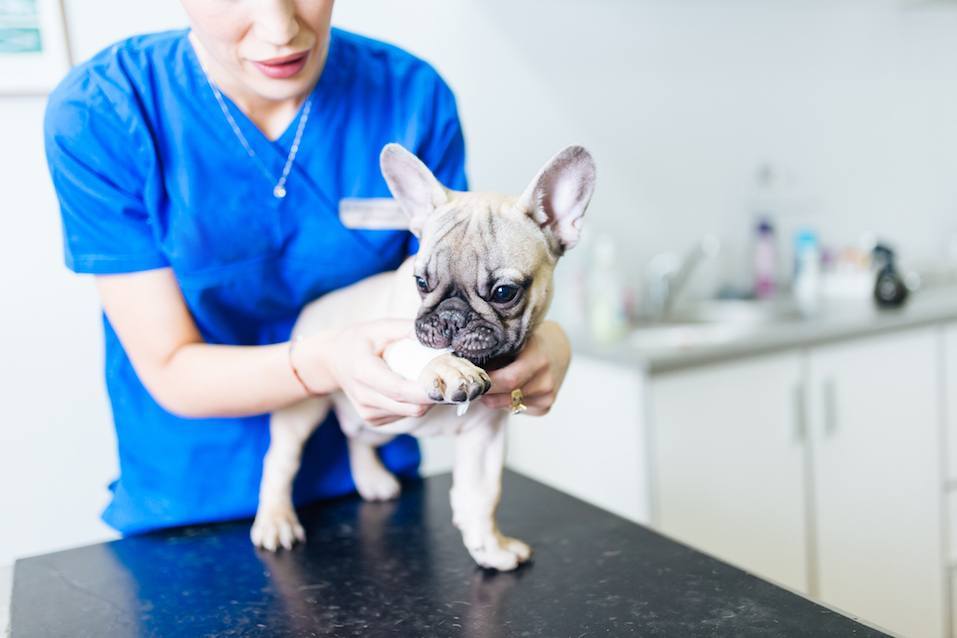The French Bulldog descended from the english Bulldog in the 1800’s when it was translocated to France. The breed has flourished as an adored companion eversince. The Frenchie is known for its bat-like ears and short, wrinkled nose. She tends to have a curious and gentle nature and is notorious for being the class clown. She will often have sporadic bouts of energy followed by prolonged periods of resting. She’s loyal and loving and prefers to not be left alone at home. The French Bulldog is a generally healthy breed with an average lifespan of 11-12 years.
Like all dog breeds, French Bulldogs come in a variety of different weights, bone structures, and plain ole sizes. We realized there was no easily read weight guide for French bulldog average weight, so we created this French bulldog weight guide just for you! French bulldog weight and diet go hand-in-hand. If your frenchie is overweight, feed slightly less over a short period of time. The same is true for the inverse.
How Much Do French Bulldogs Weigh?
A fully grown French Bulldog should weigh between 17 and 30lbs, depending on if they’re a male or female. Spayed and neutered is also a factor, as unneutered males may weigh slightly more than their neutered counterparts. Females will generally be smaller than males, sometimes weighing as little as 16-17lbs while still looking healthy and chubby, although very rarely. This means a female near 17-20lbs should not have a visible rib cage or other bone structures. The same is true for males in the 20-24lb range. Ribs and spine should never be visible on your French Bulldog. They’re naturally pleasantly plump companions and visible signs of any ribs or other bone features suggests the bulldog is underfed or underweight. If your French bulldog’s bone structure is apparent, then feed them more until they’re up to a health weight. Here is a guideline on how much do french bulldogs weigh.
Here is the French bulldog average weight:
He’s an unneutered male:
- ~26-32lbs
He’s neutered:
- ~24-28lbs
She’s spayed and has a small frame:
- ~16-22lbs
She’s spayed but has a larger frame:
- ~20-28lbs
Your French Bulldog’s Health
We know that because you care so much about your dog, you want to take good care of her. That is why we have summarized the health concerns we will be discussing with you over the life of your French Bulldog. By knowing about health concerns specific to French Bulldogs, we can tailor a preventive health plan to watch for and hopefully prevent some predictable risks.
Many diseases and health conditions are genetic, meaning they are related to your French bulldog weight. There is a general consensus among canine genetic researchers and veterinary practitioners that the conditions we’ve described herein have a significant rate of incidence and impact in this breed. That does not mean your dog will have these problems; it just means that she is more at risk than other dogs. We will describe the most common issues seen in French Bulldogs to give you an idea of what may come up in her future. Of course, we can’t cover every possibility here, so always check with us if you notice any unusual signs or symptoms.
This guide contains general health information important to all canines as well as the most important genetic predispositions for French Bulldogs. This information helps you and us together plan for your pet’s unique medical needs. At the end of the booklet, we have also included a description of what you can do at home to keep your Frenchie looking and feeling her best. You will know what to watch for, and we will all feel better knowing that we are taking the best possible care of your pal.
Dental Disease
Dental disease is the most common chronic problem in pets, affecting 80% of all dogs by age two. And unfortunately, your French Bulldog is more likely than other dogs to have problems with her teeth. It starts with tartar build-up on the teeth and progresses to infection of the gums and roots of the teeth. If we don’t prevent or treat dental disease, your buddy will lose her teeth and be in danger of damaging her kidneys, liver, heart, and joints. In fact, your French Bulldog’s life span may be cut short by one to three years! We’ll clean your dog’s teeth regularly and let you know what you can do at home to keep those pearly whites clean.
Infections
French Bulldogs are susceptible to bacterial and viral infections — the same ones that all dogs can get — such as parvo, rabies, and distemper. Many of these infections are preventable through vaccination, which we will recommend based on the diseases we see in our area, her age, and other factors.
Obesity
Obesity can be a significant health problem in French Bulldogs. It is a serious disease that may cause or worsen joint problems, metabolic and digestive disorders, back pain and heart disease. Though it’s tempting to give your pal food when she looks at you with those soulful eyes, you can “love her to death” with leftover people food and doggie treats. Instead, give her a hug, brush her fur or teeth, play a game with her, or perhaps take her for a walk. She’ll feel better, and so will you!
Parasites
All kinds of worms and bugs can invade your Frenchie’s body, inside and out. everything from fleas and ticks to ear mites can infest her skin and ears. Hookworms, roundworms, heartworms, and whipworms can get into her system in a number of ways: drinking unclean water, walking on contaminated soil, or being bitten by an infected mosquito. Some of these parasites can be transmitted to you or a family member and are a serious concern for everyone. For your canine friend, these parasites can cause pain, discomfort, and even death, so it’s important that we test for them on a regular basis. We’ll also recommend preventive medication as necessary to keep her healthy.
read also: 8 Bad Ingredients in Dog Food and Why They are Bad
Spay or Neuter
One of the best things you can do for your French Bulldog is to have her spayed (neutered for males). In females, this means we surgically remove the ovaries and usually the uterus, and in males, it means we surgically remove the testicles. Spaying or neutering decreases the likelihood of certain types of cancers and eliminates the possibility of your pet becoming pregnant or fathering unwanted puppies. Performing this surgery also gives us a chance, while your pet is under anesthesia, to identify and address some of the diseases your dog is likely to develop. For example, if your pet needs hip X-rays or a puppy tooth extracted, this would be a good time.
If you believe your French Bulldog is not maintaining a healthy weight, please read through this post about how much you should feed your French bulldog to ensure that you’re providing an adequate amount of food. Otherwise, if you’re feeding your French Bulldog the recommended amount per day and your Frenchy is not maintaining a healthy weight, then you must take your French Bulldog to a licensed veterinarian immediately. Nothing beats an expert opinion when your companion’s health and well-being are called into question. Also, this will help you to maintain your franchise on the average size of a French bulldog.
This guide is not meant to scaremonger. If your French Bulldog appears happy and healthy and they’re within the average weight of French Bulldogs in the chart, then you’re probably okay. Just be sure you’re feeding your French Bulldog the recommended 2-3 cups per day, split between two meals. If your French Bulldog appears to be overweight, consider monitoring your Frenchie while they eat and ensure they’re not making themselves welcome to your other pet’s food. Also, always feed your French bulldog a high-quality dog formula.


